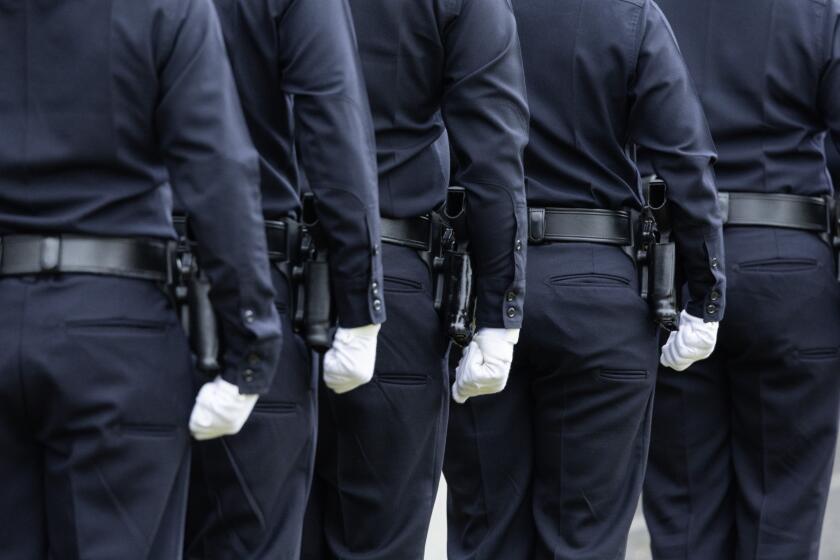Editorial: Mayor Bass’ caution shows in her pick of Jim McDonnell as LAPD chief

In selecting Jim McDonnell as the next Los Angeles police chief, Mayor Karen Bass zeroed in on crime prevention and underplayed her career-long critique of policing culture.
McDonnell, who served almost three decades with the LAPD, is a cautious choice, likely to play well with the department establishment and L.A. residents who are weary of property crime and a general sense of social disorder.
In announcing the appointment at a City Hall news conference Friday, Bass noted that as a physician’s assistant in emergency medicine in the 1980s, she saw up close the consequences of violent crime and was now focused on prevention and police response.
The Los Angeles Police Department needs a chief who can redirect a storied agency that is adrift. Mayor Bass should remember this as she assesses job finalists.
McDonnell said the city and policing have “been through a rough period of time and we’re looking to move past that.”
Bass chose McDonnell over two other finalists: Robert Arcos, a career LAPD officer who currently serves as chief of investigations under Dist. Atty. George Gascón, and Emada Tingirides, a deputy chief best known for her innovative program to remake the relationship between the LAPD and communities with a deep distrust of police. The choice means that Los Angeles will still not have a Latino or a female police chief in the immediate future. McDonnell is white.
Bass’ predecessor, Eric Garcetti, also chose a white man, Michel Moore, for chief over Arcos and Bill Scott, a Black deputy chief.
The next LAPD chief must be someone who can spot breaking crime trends and respond quickly to quell them. The LAPD has a mixed record on this.
There can be little doubt about McDonnell’s law enforcement credentials. He achieved the rank of LAPD first assistant chief under Chief William Bratton. Passed over for the top spot on Bratton’s departure in 2009, he became chief of the Long Beach Police Department, then was elected Los Angeles County sheriff in 2014 to steady the department after corruption scandals that landed Sheriff Lee Baca, the undersheriff and a number of deputies in prison.
But the choice is in many ways a curious one. McDonnell’s tenure at the Sheriff’s Department was rocky. The LAPD culture he knew clashed with the less-centralized, station-based sheriff’s culture. Deputies resisted his attempts to rewrite performance standards, and reformers were disappointed in his old-school law enforcement approach. He did little to identify, much less eradicate, deputy gangs.
He left Angelenos confused over whether he supported or opposed cooperation with immigration authorities. Voters rejected him for a second term.
The challenges that Michel Moore will face if he is confirmed to be the next chief of the Los Angeles Police Department crystallized soon after his selection was announced Monday, as he called for a new beginning for officers who could “step forward and be heard again” — and as his appointment by Mayor Eric Garcetti was blasted by community activists as a continuation of an LAPD culture of violence against nonwhite communities.
The appointment is subject to City Council approval. L.A. police chiefs serve a five-year term and are eligible for a second term.
If he is confirmed, McDonnell will lead a department that is a younger and more diverse organization than it was in 2010 when he left the LAPD.
It is also diminished, and not merely because its ranks are smaller by hundreds of officers.
The storied department too often appears directionless, with little sense of mission. Angelenos are losing confidence in its ability to protect them. McDonnell’s challenge is perhaps best crystallized in a string of convenience store robberies committed in recent months by juveniles. On bicycles.
One 7-11 store ransacked in August was hit again in September, before police had made any headway in finding the culprits.
Reaction to two brutal assaults in Venice demonstrates how emotion and politics twist the truth in crime discussion. Los Angeles leaders must do better.
Police began making arrests only when parents who recognized their kids in video of the crimes turned them in. This is not a sign that the LAPD has a handle on law and order.
Social disruptions that began in 2020 with the pandemic, the George Floyd killing and racial justice protests helped unleash waves of crime previously unknown — so-called tourist burglaries committed by South American visitors, smash-and-grab robberies of luxury stores, bicycle youth gangs ransacking convenience stores on Friday nights — and has left the public searching for someone or something to blame.
The details of LAPD discipline reform should have been worked out months before the ballot deadline, but City Hall has kept wrangling up to the last minute.
A big part of McDonnell’s job will be to restore confidence in the LAPD’s ability to keep up with crime trends.
As much as some Angelenos are looking for a tougher-on-crime approach, though, there are many who are seeking a more thorough overhaul of oppressive police practices in their communities. The perpetual challenge for any LAPD leader is to balance those sometimes conflicting goals.
More to Read
A cure for the common opinion
Get thought-provoking perspectives with our weekly newsletter.
You may occasionally receive promotional content from the Los Angeles Times.














